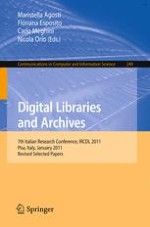This book constitutes the thoroughly refereed proceedings of the 7th Italian Research Conference on Digital Libraries held in Pisa, Italy, in January 2011. The 20 revised full papers presented were carefully reviewed and cover topics of interest such as system interoperability and data integration; formal and methodological foundations of digital libraries; semantic web and linked data for digital libraries; multilingual information access; digital library infrastructures; metadata creation and management; search engines for digital library systems; evaluation and log data; handling audio/visual and non-traditional objects; user interfaces and visualization; digital library quality.
